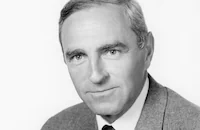Mr. Majestyk
Brief Synopsis
Cast & Crew
Richard O. Fleischer
Linda Cristal
Frank Maxwell
Jordan Rhodes
Paul Koslo
Taylor Lacher
Film Details
Technical Specs
Synopsis
When he returns from fighting in Vietnam, Vince Majestyk moves to Colorado to become a watermelon farmer. Although his intention is to lead a peaceful life, before long he finds himself in jail. While there, he crosses an organized crime boss named Frank Renda in exchange for his own freedom. So when he is released from prison, Vince finds himself the prime target of the mob. Now in addition to extorting money from all the farmers, they begin to beat up his field hands and machine-gun his crops. So Vince teams up with a Chicano activist named Nancy Chavez and starts to seek retribution against them.
Director

Richard O. Fleischer
Film Details
Technical Specs
Articles
Mr. Majestyk
Mr. Majestyk came from a story idea by Elmore Leonard (author of Get Shorty (1995) and Out of Sight, 1998). During the 60s and 70s, Leonard built a reputation on his Western novels and for his smart, quirky crime stories but screenwriting was relatively new for him. In 1970, he had adapted his novel The Moonshine War for the screen and also wrote the screenplay for Joe Kidd (1972). This time he wrote a brief outline of Mr. Majestyk at Clint Eastwood's request. When that fell through because Eastwood was working on High Plains Drifter (1972), producer Walter Mirisch acquired the rights and brought Bronson aboard. Leonard went to work writing a full script from the outline though the final film version departed significantly from Leonard's original conception. "I've never had a good experience as a screenwriter," the writer once remarked. One example is the ending of Mr. Majestyk where a major character was supposed to die; instead the director decided it would make a better ending to let him live. Luckily, Leonard DID have control when he turned his own screenplay into a novel, which was published as a paperback original in 1974 when the movie was released.
Charles Bronson was riding high at the time. He'd been in films since 1951, slowly becoming more recognizable during the 60s in Westerns (The Magnificent Seven, 1960) and war films (The Great Escape, 1963). But in the early 70s his career seemed to explode with the international success of such tough crime dramas as The Mechanic (1972), The Valachi Papers (1972) and finally Death Wish (1974).
Mr. Majestyk began filming in 1973 on a ranch in southeastern Colorado. Because the only crop that was available during the time of filming was watermelons, it was decided that Mr. Majestyk would farm those and not cantaloupes as featured in the original script. Despite the usual rigors of on-location shooting and some grueling car chase stunts, it wasn't all hard work. Gourmet meals were provided for the cast and crew though reportedly Bronson and his wife left the set for more basic chow. After all, a hard day fighting hit men and mobsters deserves a hardier meal than steamed asparagus and poached salmon.
Producer: Walter Mirisch
Director: Richard Fleischer
Screenplay: Elmore Leonard
Cinematography: Richard H. Kline
Special Effects: Robert Dawson
Film Editing: Ralph E. Winters
Original Music: Charles Bernstein
Stunts: Dick Warlock
Cast: Charles Bronson (Vince Majestyk), Al Lettieri (Frank Renda), Linda Cristal (Nancy Chavez), Lee Purcell (Wiley), Paul Koslo (Bobby Kopas), Alejandro Rey (Larry Mendoza), Taylor Lacher (Gene Lundry).
C-103m.
by Lang Thompson

Mr. Majestyk
Quotes
It ain't sunk into that thick brain of yours yet. See, everything goes a lot easier and a lot less trouble when you're doing business with me. You understand what I'm talking about?- Kopas
You make sounds like you're a mean little ass-kicker... only I ain't convinced. You keep talking and I'm gonna take your head off.- Vince Majestyk
If you want to go to bed with me, why don't you say so?- Nancy Chavez
I don't want to talk about it, I want to do it.- Vince Majestyk
Trivia
The Ford truck was not modified to do the stunts - it was pretty much box stock. Ford used clips from the film in TV commercials to demonstrate how tough their trucks are built.
Miscellaneous Notes
Released in United States Winter January 1, 1974
Released in USA on video.
Released in United States Winter January 1, 1974
















